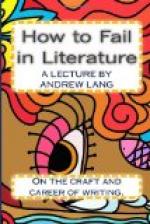We met at length, as Souls that
sit
At funeral feast, and taste of it,
And empty were the words we said,
As fits the converse of the dead,
For it is long ago, my dear,
Since we two met in living cheer,
Yea, we have long been ghosts, you
know,
And alien ways we twain must go,
Nor shall we meet in Shadow Land,
Till Time’s glass, empty of
its sand,
Is filled up of Eternity.
Farewell—enough for once
to die—
And far too much it is to dream,
And taste not the Lethaean stream,
But bear the pain of loves unwed
Even here, even here, among the
dead!
That is a cheerful intelligible kind of melody, which is often practised with satisfactory results. Every form of imitation (imitating of course only the faults of a favourite writer) is to be recommended.
Imitation does a double service, it secures the failure of the imitator and also aids that of the unlucky author who is imitated. As soon as a new thing appears in literature, many people hurry off to attempt something of the same sort. It may be a particular trait and accent in poetry, and the public, weary of the mimicries, begin to dislike the original.
“Most can grow the flowers
now,
For all have got
the seed;
And once again the people
Call it but a
weed.”
In fiction, if somebody brings in a curious kind of murder, or a study of religious problems, or a treasure hunt, or what you will, others imitate till the world is weary of murders, or theological flirtations, or the search for buried specie, and the original authors themselves will fail, unless they fish out something new, to be vulgarised afresh. Therefore, imitation is distinctly to be urged on the young author.
As a rule, his method is this, he reads very little, but all that he reads is bad. The feeblest articles in the weakliest magazines, the very mildest and most conventional novels appear to be the only studies of the majority. Apparently the would-be contributor says to himself, or herself, “well, I can do something almost on the level of this or that maudlin and invertebrate novel.” Then he deliberately sits down to rival the most tame, dull, and illiterate compositions that get into print. In this way bad authors become the literary parents of worse authors. Nobody but a reader of MSS. knows what myriads of fiction are written without one single new situation, original character, or fresh thought. The most out-worn ideas: sudden loss of fortune; struggles; faithlessness of First Lover; noble conduct of Second Lover: frivolity of younger sister; excellence of mother: naughtiness of one son, virtue of another, these are habitually served up again and again. On the sprained ankles, the mad bulls, the fires, and other simple devices for doing without an introduction between hero and heroine I need not dwell. The very youngest of us is acquainted with these expedients, which, by this time of day, will spell failure.




